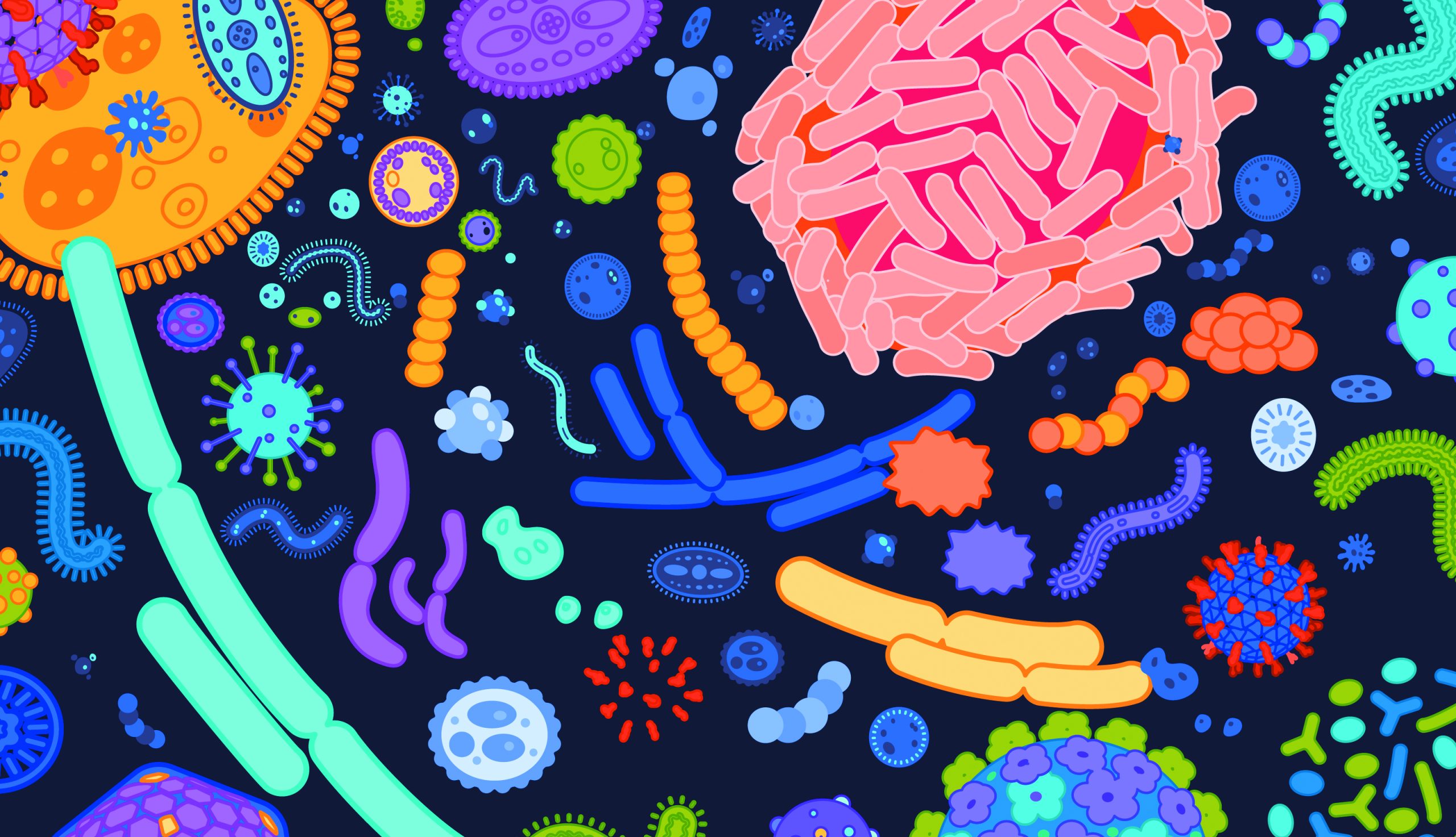Authored by Elizabeth A. Dorn, M.S.N., C.R.N.P
Our unique microbiome, a key factor in gut health, influences our physical, mental and emotional health. Last month we discussed what it is and how a diverse microbiome supports our bodies, as well as the impact of a microbiome that is imbalanced. As promised, this month’s article will address ways we can enhance the gut microbiota to give ourselves the best advantage possible. We’ll also discuss the difference between prebiotics, probiotics and postbiotics; chemicals found in foods and supplements that have been demonstrated to prevent infections and strengthen the immune system.
Probiotics are live bacteria and yeasts present in cultured foods, such as yogurt, kombucha, tempeh, sauerkraut, and soft cheese. Prebiotics are fibers that feed the probiotics, found in raw versions of garlic, onions, leeks, asparagus, Jerusalem artichokes, dandelion greens, bananas, and seaweed. Fruits, vegetables, beans and whole grains, such as wheat, oats, and barley are all good sources of prebiotic fibers. Postbiotics are the chemicals released when probiotics feed on prebiotics in the intestines. They can be found in sauerkraut, fermented soybean soup, soft cheeses, slow fermented bread, and buttermilk. All of these can be taken as supplements, but according to nutrition experts, vitamins, minerals, and nutrients (including those that support gut health) are most potent when obtained from food sources.
Adopting a gut-healthy diet starts with small changes, such as eating a diet that includes fiber from colorful fruits and vegetables and limiting one’s intake of red meat, which lowers the number and diversity of gut microbes. This doesn’t mean never having burgers, but nutritionists suggest balancing your plate with sweet potatoes, spinach, beets, carrots, fennel, raspberries, artichokes, green peas, broccoli, chickpeas, lentils, beans, bananas, apples, and whole grains. Add beans or oatmeal to that burger and put it in a lettuce leaf or on a whole grain bun. Swap fries for a baked sweet potato or kimchi and have a black bean brownie or unsweetened yogurt with berries for desert!
Exercise often. Regular exercise can supplement the number of beneficial microbial species, improve the microflora diversity, and add to the development of bacteria that help protect the immune system. Human and animal studies indicate that probiotics have the potential to diminish the inflammatory response to chronic stressors, and to prevent or reverse the effect of chronic inflammation. Another good reason to get moving! Walking, swimming, jogging, cycling, pickleball, strength training…. Interestingly, researchers at the University of Pennsylvania recently found that, in mice, thriving gut microbiomes have been linked with optimal muscle function. These findings suggest that the gut microbiome may help regulate the desire to exercise. If confirmed in humans, this may explain why so many Americans fail to get the recommended amount of physical activity, and may lead to microbiome-based efforts to get sedentary people off the couch or optimize athletic performance!
Consider a probiotic supplement if you’ve been ill. Since good bacteria are a natural part of the body, taking a probiotic supplement isn’t essential. Data is mixed as to whether probiotics actually benefit a body in balance, but they do appear to improve the microbiome in those with certain diseases. Use of antibiotics to kill bad bacteria may diminish some of the body’s good bacteria, so some people choose to take probiotics after taking an antibiotic in order to reintroduce good bacteria into the body.
Studies have also demonstrated that probiotic administration has positive effects on mood state, suggesting possible roles for probiotic therapy for depression. Research has been done on the use of probiotics in treatment of anxiety and depression both as standalone therapy and as adjunct to commonly prescribed medications
Before taking a supplement, it’s important to discuss with your healthcare provider whether you have a condition that could be improved by the use of probiotics. Some probiotics trigger allergic reactions and can cause stomach upset, diarrhea, flatulence, and bloating. Caution should be used in infants and people who have a weakened immune system, a critical illness, or have recently had surgery .
If breastfeeding, try to do so for at least 6 months. Breastfeeding helps an infant develop a healthy microbiome, which is associated with lower rates of allergies, obesity, and may help protect against certain health conditions later in life.
Hopefully this helped clarify some of the information that appears often in health news. For more information take a look at the sites https://www.hopkinsmedicine.org or https:www.bbc.co.uk for well explained facts in easily understood language.
Turkey burgers with Hot pepper paste & Kimchi
Ingredients
1 lb lean ground turkey
2 scallions, sliced
8 teaspoons Korean chile paste
1 tsp toasted sesame oil
2 Tbsp low-fat mayonnaise
4 small whole-wheat hamburger buns, toasted
12 slices English cucumber
1 cup kimchi
Directions
1. Prepare grill to medium-high
2. Combine turkey, scallions, 5 tsp chile paste and sesame oil in a medium bowl; gently knead together. Do not overmix. Form into 4burgers, about 4 inches wide
3. Oil the grill rack. Grill the burgers until an instant-read thermometer inserted in the center registers 165 degrees F, 3-4 minutes per side. Let rest for 5 minutes
4. Meanwhile, combine mayonnaise and the remaining 3 Tbsp chile paste in a small bowl. Assemble the burgers on toasted buns with 2 tsp of the mayonnaise mixture, 3 slices cucumber and 1⁄4 cup kimchi each.


